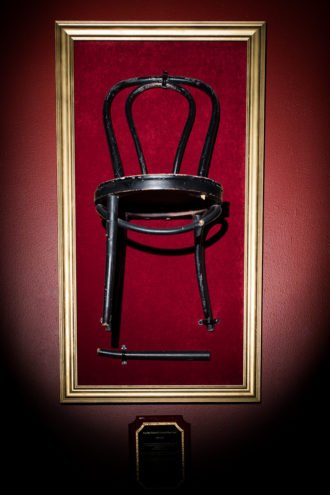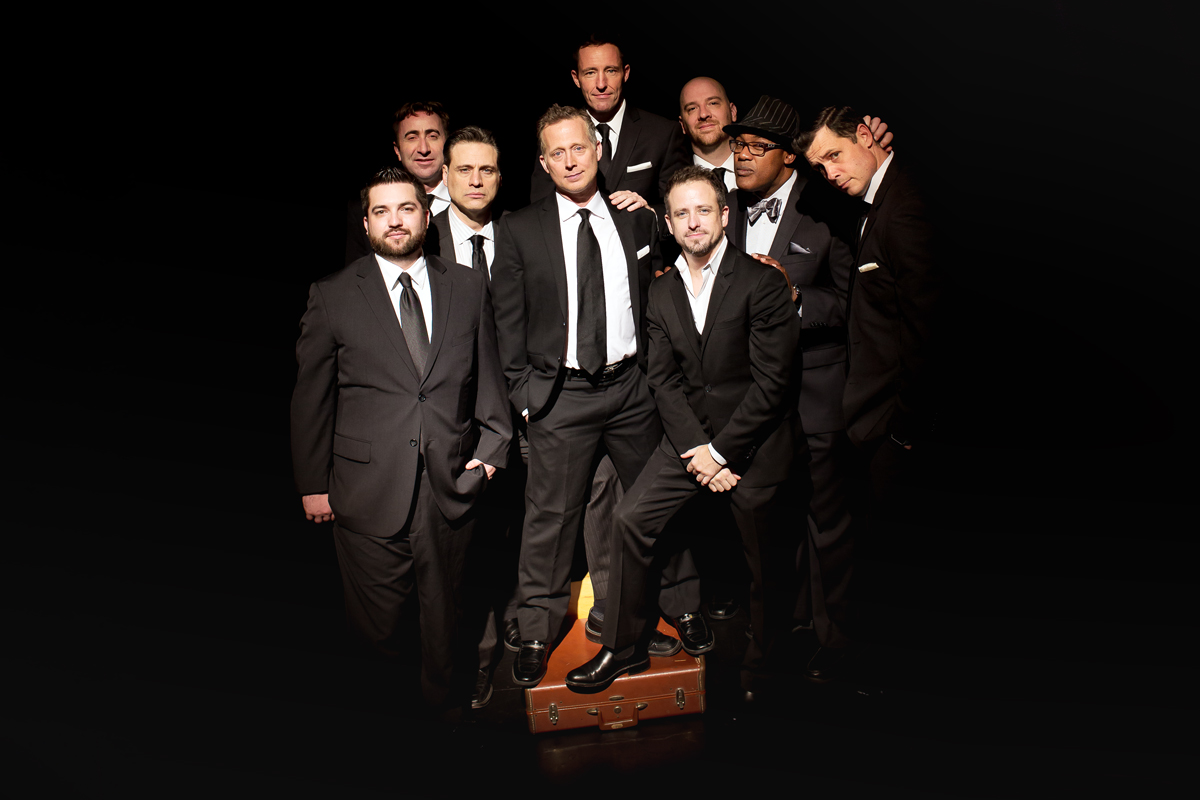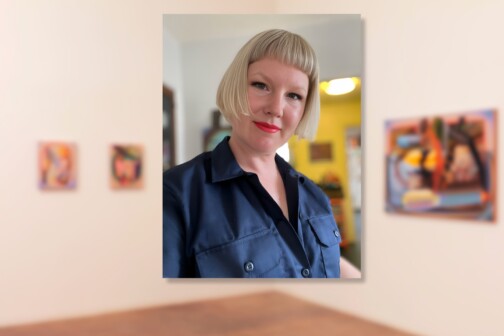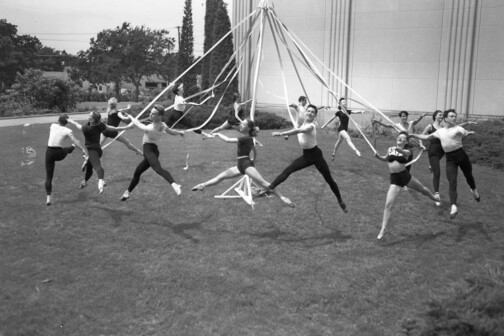Having wasted my first year out of college working two stupid restaurant jobs and dating one stupid boy, I moved from San Antonio into my dad’s house in a Grapevine cul-de-sac. I was 23 and had no job. I didn’t know what I wanted to do, just that I didn’t want it to be something boring. After sending emails to a few theaters asking if they could use a volunteer, I heard back from the Fort Worth improv comedy troupe Four Day Weekend, the stars of what was and still is the longest-running show in North Texas. The founders—David Wilk, David Ahearn, and Frank Ford—invited me to get a cup of coffee and ended up hiring me. They gave me a makeshift office under the stairs in the first-floor lobby of their Sundance Square theater and a stack of my very own business cards. “House Manager,” the cards read. My first real job.
Real as it was, there were nontraditional workplace moments on occasion, which, I guess, comes with the territory when working with comedians. One weekday they showed up unannounced and said they needed to push me out of a car onto the sidewalk. The deodorant ad parody they filmed that day, including my exceptionally weak pratfall, still exists on YouTube, an indelible reminder that I was not born to perform.
But mostly I answered the phone, passed out fliers, kept track of ticket sales (Wilk called for them frequently; I still know his phone number by heart), and explained what an improvisational comedy show was probably 100 times a week to the people who thought they were walking into the steakhouse next door. My 10-second spiel: “Think of it as Whose Line Is It Anyway? meets Saturday Night Live. The guys take suggestions from the audience to come up with different sketches and songs. It’s all on the spot!” (Cue: dimple.)

It hangs in the theater, and a plaque beneath it reads: “This chair was adopted (stolen) from Casa Mañana’s Theater on the Square on Four Day Weekend’s opening night, February 28, 1997. It has been with us ever since. This chair has appeared in more than 4,000 shows and 25,000 scenes. It has and always will be an original member of the cast. This beloved chair has been a marching band drum, hooker’s high heel shoe, crown, canoe, car, airplane, tank, toilet, couch, hospital bed, bagpipe, prison cell, bird cage, angel wing, and countless other memories. Our dependable black chair met its untimely demise in an unfortunate bobsledding accident on January 17, 2015. You are gone but not forgotten. Rest in pieces, old friend.”
After handing out tickets to the door-busting line of suburban couples, tipsy TCU coeds, rowdy birthday partygoers, tourists, and comedy nerds on Friday and Saturday nights, I would sneak upstairs to the lighting booth and watch the rest of the show. One night, they unknowingly picked my uncle out of the audience and found out he was a pastor who helped produce the first Farm Aid with Willie Nelson. They turned his story into a musical rendition about “Paul the Pot-Smoking Preacher Man” that brought down the house. Others in the audience shook my uncle’s hand as they left the theater. It’s no wonder people kept coming back; the ones they picked on came out heroes.
At that point, Four Day Weekend consisted of Ahearn, the dry-witted host and co-founder; Ray Sharp, a puppy-eyed pianist they found playing at a restaurant around the corner; and four improvisers: co-founders Wilk (shorter) and Ford (taller), plus Josh Roberts (most likely to be in a boy band) and Oliver Tull (a solid contender for quickest draw when it came to one-liners). They’ve since added performers Anthony Bowling and Andrew Hamer, and brought back co-founder Troy Grant, a Nic Cage look-alike who moved to Los Angeles for several years, perhaps looking for his big break.
But, it turns out, to make it big in comedy, these guys never had to go much farther than the curb they kicked me out on.
The four day founders met on the Dallas comedy scene in the ’90s, when they were all twentysomethings vying for stage time. Several studied at Chicago’s Second City, the improv theater and training center that has served as a breeding ground for everyone from John Belushi to Bill Murray to Steve Carell. David Wilk was still taking classes there (his dad owned an air freight company, and he’d fly round trip in the back of the cargo plane one day each week) when he and a few others formed their own troupe, naming it after a punchline from The Simpsons.
They each put in $700 to buy wigs, costumes, and fliers, and got access to a 100-seat theater in Sundance Square. The troupe went on Friday and Saturday nights at 11 pm after a production of Forever Plaid. The theater took 20 percent of the gate, and their agreement with the lighting guy was $50 and a six-pack of beer. “The guy would drink all six beers while he ran the lights, I swear to God,” Ahearn says.
It was 1997, the same year Tina Fey was pulled from Second City’s stages to write for SNL. Just as Amy Poehler and Adam McKay were gaining momentum with the Upright Citizens Brigade in New York. And one year before Whose Line Is It Anyway? debuted on TV. But while there was a national sketch and improv renaissance brewing, the people of Fort Worth had no idea what Four Day Weekend was doing.
“The night before, we were an improv troupe from Fort Worth, Texas. The next day we were experts in our field.”
“I would get there at 3 pm and hand out fliers, then set up a little table at 10 pm to sell tickets to the nine or 10 people we talked into coming,” Wilk says. “Then I picked up the table at 11 pm, ran back, changed clothes, and entertained those 10 people.” Word of mouth and a write-up in the paper helped. “So then 10 turned to 16, 16 to 24, 24 to 40, and then it was full. We needed a bigger theater.”
Shortly after the troupe began performing, Wilk’s rooftop wedding rehearsal dinner at the now-shuttered Caravan of Dreams was rained out. So the staff set up the party in a theater space that had been dark for years. The theater—one of Ed Bass’ pet projects in the early ’80s, where William S. Burroughs and Timothy Leary had performed—held 212 red-velvet seats, a bar, and a large lounge area once used as a dance studio. It became the Four Day Weekend Theater.
In the few years after their 10th anniversary, Four Day had a rendezvous with Hollywood that nearly ended its run. Twentieth Century Fox bought a show from them based on Wilk’s real-life experiences as a cruise ship entertainer. Because they were essentially no-names in L.A., the studio hired a writer from South Park to head it up. With each rewrite of the script, the further it strayed from the original idea. The pilot was killed.
But after their “sacrificial lamb,” they were no longer no-names, and their agency asked for another script. The Four Day founders were at a crossroads. They either needed to make the move to the West Coast or stay in North Texas to focus on the troupe.
“We had to ask ourselves, Were we willing to let this thing that we built with blood, sweat, and tears for all these years go away?” Ford says. “Or do we band together like never before and make it bigger and better?”
Ahearn, Wilk, and Ford went with the latter. The three founding members, who have stuck around all 20 years and performed in all 5,000-plus shows, have since built Four Day Weekend into something of an improv empire. They sell out four shows each weekend, run a training center complete with a swanky 48-seat theater space, serve as entrepreneurs-in-residence for TCU’s business program, and maintain a lucrative corporate arm (not surprisingly, improvisers are great to have around when the power goes out during a $1 million event with 5,000 people). The fastest-growing part of their business: a keynote address they developed using the tenets of improv, most notably, the “Yes, and … ” philosophy, which promotes collaboration and communication. They live their lives by it.
It would be easy to brush off the “Yes, and … ” talk as motivational drivel, especially when they say things like “We’re just a group of guys who put in $700 apiece and ‘yes anded’ their way to the president of the United States.” Except that, yeah, they really are an improv troupe who has met not one but two presidents. The first was President Obama in 2011, after they delivered their keynote address to 100 members of Congress, a game-changing gig. “The night before, we were an improv troupe from Fort Worth, Texas,” Wilk says. “The next day we were experts in our field.”
Since then, they’ve also served as the opening act for George W. Bush at two corporate speaking events. Bush calls them his “Texas homeboys” and asked them to perform for the troops. In 2015, they went on a USO tour of nine bases, including a stop in Kosovo that got weird when they met a sergeant by the name of George W. Bush who told them he always wanted to get a personally autographed picture of President George W. Bush. They made it happen.
“You get a group of ‘Yes, and … ’ people who are best friends, who are getting together to be the best they can be at a particular art form, and it’s unstoppable,” Ford says.
Ultimately, “Yes, and … ” is a marketable two-word way of saying, “When an opportunity appears, go with it.” The guys of Four Day are successful because they’ve done just that—whether it’s writing a book or making a harebrained toy idea like Maccabee on the Mantel (think: a Jewish version of The Elf on the Shelf) come to fruition. Their book, Happy Accidents, is due out next fall via John Wiley & Sons, and they sold the toy company for a profit last year.
The year before I left Four Day, I started writing for a part of their website called The Weekend Report, comprised of Onion-style satirical stories. I always enjoyed writing, always had a copy of New York magazine in my tote bag, but it never occurred to me that I could get paid to do it. When I came across an arts journalism program, I applied on a whim. One of my writing samples was a story I had written after babysitting Ahearn’s kids, an honest critique of his 3-year-old son’s living-room performance of “Cheeseburger in Paradise.” Somehow, I got in.
Before working at Four Day, I had no idea that I could do what I love and make a living at it. I don’t know if I would have ever figured that out had I not sat up in that lighting booth and watched those guys do it every weekend. That, and been given a good, hard push.
Write to [email protected].







